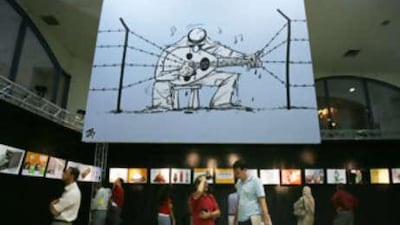AMMAN // Jordanians are not known for their love of jokes, but the cartoon character Abu Mahjoob, created by Emad Hajjaj to represent the average man on the street, has got many of the kingdom's citizens laughing. Through his wife, Um Mahjoob, children and big-bellied friend, Abu Mohammed, Abu Mahjoob tackles the issues that ordinary Jordanians face, from spiralling inflation to the abandonment of illegitimate babies and food poisoning cases that prompted authorities to slap a ban on selling chicken shawarma last year.
"Abu Mahjoob is our mirror. When we see the cartoons we know what is going on. He is like a compass that shows where the street pulse is heading to," said Wafa Adham, who was looking at the caricatures at an exhibition in Amman's City Hall. The exhibition coincided with the launch of Mr Hajjaj's new book, Abu Mahjoob 2. "He expresses our concerns ? and he makes me laugh," said Ms Adham's sister, Hanan.
While political satire is not new in Jordan, Mr Hajjaj appears to have found the perfect balance between poking fun at people, including government officials, and remaining within Jordan's strict press laws. In one of his cartoons, Abu Mahjoob is talking to Abu Mohammed about the increase in food prices and says that soon even the mujadara, a dish of lentils and yoghurt usually eaten by the poor, will be too pricey for them. "So what will this turn us into?" he asks
"Into cannibals," replies his friend. Some of the cartoons take aim at the politics of the region, touching on the violence in Iraq, the Israeli-Palestinian conflict and in-fighting among Palestinian factions. He has ridiculed the demise of moderates, the humiliation of Arabs by their stereotyping in the West, and has depicted the Iraqi government of Nouri al Maliki, the prime minister, as a puppet in the hands of both Iran and George W Bush.
In one cartoon, Mr Hajjaj depicted an alarmed Abu Mahjoob calling for police help after his son came home wearing the outfit of a radical Salafi Muslim and holding a sword. "Help, my son has been taken by God!" he said, in reference to the Islamists who justify killings in the name of religion. Mr Hajjaj has risen to fame as Jordan's most popular cartoonist by pushing the boundaries with the content of his drawings, said Nabil Gheishan, a member of Jordan's Press Association.
Abu Mahjoob, a character inspired by Mr Hajjaj's late father, a retired military man, made his first appearance in 1993. Mr Hajjaj set a precedent in 1999 when he portrayed Jordan's King Abdullah II in a cartoon just months after he took office. The king was depicted as an inmate in prison, a tourist, a student and a television reporter as a way to show that Jordanians should be aware the monarch is always watching.
It was the first time the king had ever been depicted in a cartoon, and it raised questions about how far Mr Hajjaj could push the boundaries of acceptable satire. It is a criminal offence to insult the king and the royal family in Jordan, but Mr Hajjaj's cartoons were subsequently not seen as lampooning the monarch. He angered women last month with a cartoon that depicted Arab women as superficial.
The cartoon, which appeared in the Al Ghad newspaper, was related to Noor, the Turkish soap opera which is hugely popular in Jordan and across the region. The cartoon showed a Turkish agent whispering to Mohannad, the drama's protagonist. "Mohannad Afandi ? the Arab woman is one of your fans. She is her own enemy at elections! Accepts to be beaten [by her husband] and accepts polygamy! Likes giving birth to boys and hates girls! Doesn't finish her education to keep up with the tradition! She is a brunette plagued by her [inferiority] complex to blondes! Modern on the outside but empty on the inside."
Asmara Khader, a women's rights activist and head of the Jordanian National Commission for Women, lashed out at his caricature of Arab women, saying the women he showed were the exception to the norm and should not be generalised. "Women should not be blamed for this negative behaviour, but society, with its men and women as a result of the negative conceptions and traditions," she wrote in a protest letter to Al Ghad last month.
Mr Hajjaj defended his work, saying he was trying to provoke discussion on the issue. "I always support women and this is reflected in my cartoons against honour crimes and injustice against women. But in this cartoon. I have intended to shock them in order to provoke change." But as press freedoms in Jordan have suffered a setback, Mr Hajjaj has had to modify his cartoons, and in some cases they have not been published.
Still, he is able to publish them on his website as rules governing internet publishing remain vague. Samir Hyari, who heads an independent news website, said Mr Hajjaj's caricatures have become less controversial in recent years. "With the setback in press freedoms, his cartoons are not as daring as before. His cartoons were so powerful when he used to depict prime ministers. Abu Mahjoob has also turned into a commercial character," he said, in reference to Mr Hajjaj's using Abu Mahjoob's character for his private projects.
"If Hajjaj has the freedom to work, no one can surpass him in the Arab world ? his work will resonate further," said Hassan Beer, who has been selling books for 32 years at a kiosk in downtown Amman. @Email:smaayeh@thenational.ae

